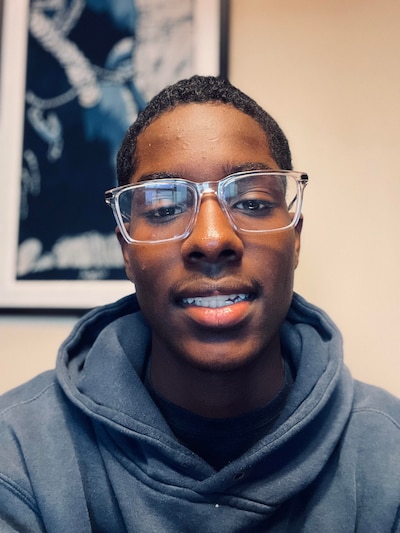This fall, I’ll enter my senior year of high school, and I’ve already begun to think beyond graduation and what comes next for me. These past few years have pointed me toward a career in journalism and specifically sports reporting.
How did I arrive here?
For one, I love sports. Every sport: basketball, baseball, football, skating; well, every sport besides hockey, probably because I can never see the puck. I crave the lively atmosphere sports create, where anything can happen, good or bad; it always keeps me on edge.

I feel very comfortable playing, analyzing, and writing about sports. Throughout my life, my classmates and I would argue playfully about players, teams, and statistics. When I’d drop esoteric sports knowledge, they’d ask me how I knew so much. In elementary and middle school, I could — right hand to god — give a breakdown of every player on the Chicago Bulls’ rosters every year. I could tell anyone anything they needed to know about any player. I was a walking Bulls Wikipedia page. No exaggeration whatsoever.
But my love of sports is just part of the equation. Mrs. Flint, my eighth grade composition teacher, also played a role. One day, she came up to me to talk about an essay I’d written. (I forget now what it was about; sorry, reader.) She complimented me on it and gave me some feedback. I didn’t think much of it until she asked me whether I had enrolled in honors English for the following year. I told her I was leaning against it because others had told me that it was like the standard English class, just with added work.
She seemed confused and sore — sitting there for about 10 seconds, before starting in on a spiel, noting how much she loved my writing and saw potential in me. She told me that taking the regular classes would be “cutting myself short.”
Leaving that conversation, I wasn’t convinced. But I appreciated how much she cared and how much she poured her all into me. I thought about what she said for about a day and then enrolled in the regular class. I’m joking. I enrolled in honors English and other honors classes and thanked Mrs. Flint for helping me decide.
I went on to do very well in my English classes and discovered my passion for writing. During my sophomore year, I began to think about what I wanted to do after high school. I took multiple online career assessments, came across journalism, and did a deep dive into what the career entails. After all of my research, I knew what I wanted to do for the rest of my life; I wanted to become a sports journalist. The career matched all of my idealities, encompassing my love of sports and emerging talent for writing.
Having discovered my passion so early in life, I began my sports blog, The Ball Talk, to share my perspective on sports, improve my writing skills, and start doing what I now saw as my future career.
The career matched all of my idealities, encompassing my love of sports and emerging talent for writing.
To my peers who don’t yet know what they want to do after high school: You have time. My advice to you would be to spend your high school years trying things to determine what you like doing, what you’re good at, and what’s a non-starter. Remember, there are so many different careers — ones you haven’t even heard of yet — so never think there is nothing out there that will make you happy.
Writing makes me happy. And with practice, I’ve gotten better at doing it. Last summer, I took part in various high school journalism programs (at Temple University, University of Missouri-St. Louis, and Missouri University).
But it wasn’t till I moved back to Chicago last summer, that I was exposed to a multitude of journalism opportunities. In just my first week of school at Perspectives at Joslin, which I attended before transferring to Noble Academy, my then college counselor, Ms. Johnson, connected me with TrueStar magazine, a Black youth-led publication in Chicago. Soon I was writing for TrueStar regularly about sports, tech, world news, and more. My first published article there was about the New England Patriots releasing Cam Newton, and I’ll never forget how accomplished I felt when it came out. I remember posting my article everywhere on social media and seeking out feedback on it. Nowadays, I’m used to seeing my byline. But when it was still novel, I was sure to send my dad and aunt every article I wrote.
Over time, I’ve begun to think less about the mechanics of writing, which has become second nature, and more about what I want to achieve when I’m writing. What do I want the reader to know? I want the reader to know the truth. Without bias, without the misinformation that often divides us.
Journalistic ethics are important to me. These past two years, especially amid COVID, we’ve seen how dangerous misinformation can be. I strive to always be authentic, accurate, curious, and do quality work. We need fewer journalists who are bypassing facts to chase a certain narrative. We need more journalists — those who specialize in politics, climate, health, education, and (yes!) sports — to provide accurate reports. I will be one of them.
Jeremiah Griffith is a rising senior at Noble Academy in Chicago. He is a sportswriter for TrueStar magazine, a Chalkbeat Student Voices fellow, and previously managed his own sports blog, The Ball Talk. Jeremiah is also a volunteer at Rush University Medical Center, and he is a member of the National Honors Society and the National Association of Black Journalists. At Noble, he’s in the chess club and a track team co-captain. Read his recent Chalkbeat essay, “My aunt recognized my potential. That changed my life.”

